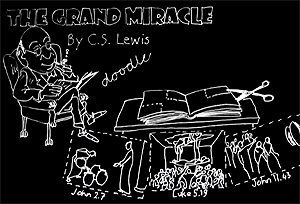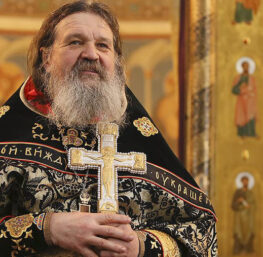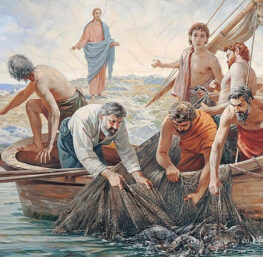 by C.S. Lewis
by C.S. Lewis
One is very often asked as present whether we could not have a Christianity stripped, or, as people who ask it say, “freed” from its miraculous elements, a Christianity with the miraculous elements suppressed. Now, it seems to me that precisely the one religion in the world, or at least the only one I know, with which you could not do that is Christianity. In a religion like Buddhism, if you took away the miracles attributed to Gautama Buddha in some very late sources, there would be no loss; in fact, the religion would get on very much better without them because in that case the miracles largely contradict the teaching. Or even in the case of a religion like Mohammedanism, nothing essential would be altered if you took away the miracles. You could have a great prophet preaching his dogmas without bringing in any miracles; they are only in the nature of a digression, or illuminated capitals.
But you cannot possibly do that with Christianity, because the Christian story is precisely the story of one grand miracle, the Christian assertion being that what is beyond all space and time, which is uncreated, eternal, came into Nature, into human nature, descended into His own universe, and rose again, bringing Nature up with Him. It is precisely one great miracle. If you take that away there is nothing specifically Christian left. There may be many admirable human things which Christianity shares with all other systems in the world, but there would be nothing specifically Christian.
Conversely, once you have accepted that, then you will see that all well-established Christian miracles are part of it. That they all either prepare for, or exhibit, or result from the Incarnation. Just like every natural event exhibits the total character of the natural universe at a particular point in space of time, so every miracle exhibits the character of the Incarnation.
Now, if one asks whether that central grand miracle in Christianity is itself probable or improbable, of course, quite clearly you cannot be applying Hume’s kind of probability. You cannot mean a probability based on statistics according to which the more often a thing has happened, the more likely it is to happen again (the more often you get indigestion from eating a certain food, the more probable it is, if you eat it again, that you will again have indigestion).
Certainly the Incarnation cannot be probable in that sense. It is of its very nature to have happened only once. But then it is of the very nature of the history of this world to have happened only once; and if the Incarnation happened at all, it is the central chapter of that history. It is improbable in the same way in which the whole of nature is improbable, because it is only there once, and will happen only once. So one must apply to it a quite different kind of standard.
I think we are rather in this position. Supposing you had before you a manuscript of some great work, either a symphony or a novel. There then comes to you a person, saying, “Here is a new bit of the manuscript that I found; it is the central passage of that symphony, or the central chapter of that novel. The text is incomplete without it. I have got the missing passage which is really the center of the whole work.”
The only thing you could do would be to put this new piece of the manuscript in that central position, and then see how it reacted on the whole of the rest of the work. If it constantly brought out new meanings from the whole of the rest of the work, if it made you notice things in the rest of the work which you had not noticed before, then I think you would decide that it was authentic. On the other hand, if it failed to do that, then, however attractive it was in itself, you would reject it.
Now, what is the missing chapter in this case, the chapter which Christians are offering? The story of the Incarnation is the story of a descent and resurrection. When I say “resurrection” here, I am not referring simply to the first few hours, or the first few weeks of the Resurrection. I am talking of this whole, huge pattern of descent, down, down, and then up again. What we ordinarily call the Resurrection being just, so to speak, the point at which it turns.
Think what that descent is. The coming down, not only into humanity, but into those nine months which precede human birth, in which they tell us we all recapitulate strange prehuman , subhuman forms of life, and going lower still into being a corpse, a thing which, if this ascending movement had not begun, would presently have passed out of the organic altogether, and have gone back into the inorganic, as all corpses do.
One has a picture of someone going right down and dredging the sea bottom. One has a picture of a strong man trying to lift a very big, complicated burden. He stoops down and gets himself right under it so that he himself disappears; and then he straightens his back and moves off with the whole thing swaying on his shoulders.
Or else one has the picture of a diver, stripping off garment after garment, making himself naked, then flashing for a moment in the air, and then down through the green, and warm, and sunlit water into the pitch-black, cold, freezing water, down into the mud and slime, then up again, his lungs almost bursting, back again to the green and warm and sunlit water, and then at last out into the sunshine, holding in his hand the dripping thing he went down to get. This thing is human nature; but, associated with it, all Nature, the new universe.
Now, as soon as you have thought of this, this pattern of the huge dive down to the bottom, into the depths of the universe and coming up again into the light, everyone will see at once how that is imitated and echoed by the principles of the natural world; the descent of the seed into the soil, and its rising again in the plants.
There are also all sorts of things in our own spiritual life where a thing has to be killed, and broken, in order that it may then become bright, and strong, and splendid. The analogy is obvious.
In that sense the doctrine fits in very well, so well in fact that immediately there comes the suspicion, Is it not fitting in a great deal too well? In other words, does not the Christian story show this pattern of descent and reascent because that is part of all the nature religions of the world? We have read about it in The Golden Boughs. We all know about Adonis, and the stories of the rest of those rather tedious people; is not this one more instance of the same thing, “the dying god”? Well, yes it is. That is what makes the question subtle.
What the anthropological critic of Christianity is always saying is perfectly true. Christ is a figure of that sort. And here comes a very curious thing. When I first, after childhood, read the Gospels, I was full of that stuff about the dying god, The Golden Bough, and so on. It was to me then a very poetic, and mysterious, and quickening idea; and when I turned to the Gospels never will I forget my disappointment and repulsion at finding hardly anything about it at all. The metaphor of the seed dropping into the ground in this connection occurs (I think) twice in the New Testament,[2] and for the rest hardly any notice is taken; it seemed to me extraordinary. You had a dying God, Who was always representative of the corn: you see Him holding the corn, that is, bread, in His hand, and saying, “This is My Body,”[3] and from my point of view, as I then was, He did not seem to realize what He was saying. Surely there, if anywhere, this connection between the Christian story and the corn must have come out; the whole context is crying out for it. But everything goes on as if the principal actor, and still more, those about Him, were totally ignorant of what they were doing.
It is as if you got very good evidence concerning the sea serpent, but the men who brought this good evidence seemed never to have heard of sea serpents. Or to put it in another way, why was it that the only case of the “dying god” which might conceivably have been historical occurred among a people (and the only people in the whole Mediterranean world) who had not got any trace of this nature religion, and indeed seemed to know nothing about it? Why is it among them the thing suddenly appears to happen?
The principal actor, humanly speaking, hardly seems to know of the repercussions His words (and sufferings) would have in any pagan mind. Well, that is almost inexplicable, except on one hypothesis. How if the corn king is not mentioned in that book, because He is here of whom the corn king was an image? How if the representation is absent because here, at last, the thing represented is present? If the shadows are absent because the thing of which they were shadows is here?
The corn itself is in its far-off way an imitation of the supernatural reality; the thing dying, and coming to life again, descending, and reascending beyond all Nature. The principle is there in Nature because it was first there in God Himself. Thus one is getting in behind the nature religions, and behind Nature to Someone Who is not explained by, but explains, not, indeed, the nature religions directly, but that whole characteristic behavior of Nature on which nature religions were based. Well, that is one way in which it surprised me. It seemed to fit in a very peculiar way, showing me something about Nature more fully than I had seen it before, while itself remaining quite outside and above the nature religions.
Then another thing. We, with our modern democratic and arithmetical presuppositions would so have liked and expected all men to start equal in their search for God. One has the picture of great centripetal roads coming from all directions, with well-disposed people, all meaning the same thing, and getting closer and closer together. How shockingly opposite to that is the Christian story!
One people picked out of the whole earth; that people purged and proved again and again. Some are lost in the desert before they reach Palestine; some stay in Babylon; some becoming indifferent. The whole thing narrows and narrows, until at last it comes down to a little point, small as the point of a spear-a Jewish girl at her prayers. That is what the whole of human nature has narrowed down to before the Incarnation takes place. Very unlike what we expected, but, of course, not in the least unlike what seems, in general, as shown by Nature, to be God’s way of working.
The universe is quite a shockingly selective, undemocratic place out of apparently infinite space, a relatively tiny proportion occupied by matter of any kind. Of the stars perhaps only one has planets: of the planets only one is at all likely to sustain organic life. Of the animals only one species is rational. Selection as seen in Nature, and the appalling waste which it involves, appears a horrible and an unjust thing by human standards.
But the selectiveness in the Christian story is not quite like that. The people who are selected are, in a sense, unfairly selected for a supreme honor; but it is also a supreme burden. The people of Israel come to realize that it is their woes which are saving the world. Even in human society, though, one sees how this inequality furnishes an opportunity for every kind of tyranny and servility.
Yet, on the other hand, one also sees that it furnishes an opportunity for some of the very best things we can think of — humility, and kindness, and the immense pleasures of admiration. (I cannot conceive how one would get through the boredom of a world in which you never met anyone more clever, or more beautiful, or stronger than yourself. The very crowds who go after the football celebrities and film stars know better than to desire that kind of equality!)
What the story of the Incarnation seems to be doing is to flash a new light on a principle in Nature, and to show for the first time that this principle of inequality in Nature is neither good nor bad. It is a common theme running through both the goodness and badness of the natural world, and I begin to see how it can survive as a supreme beauty in a redeemed universe.
And with that I have unconsciously passed over to the third point. I have said that the selectiveness was not unfair in the way in which we first suspect, because those selected for the great honor are also selected for the great suffering, and their suffering heals others. In the Incarnation we get, of course, this idea of vicariousness of one person profiting by the earning of another person. In its highest form that is the very center of Christianity. And we also find this same vicariousness to be a characteristic, or, as the musician would put it, a leitmotif of Nature.
It is a law of the natural universe that no being can exist on its own resources. Everyone, everything, is hopelessly indebted to everyone and everything else. In the universe, as we now see it, this is the source of many of the greatest horrors: all the horrors of carnivorousness, and the worse horrors of the parasites, those horrible animals that live under the skin of other animals, and so on.
And yet, suddenly seeing it in the light of the Christian story, one realizes that vicariousness is not in itself bad; that all these animals, and insects, and horrors are merely that principle of vicariousness twisted in one way. For when you think it out, nearly everything good in Nature also comes from vicariousness. After all, the child, both before and after birth, lives on its mother, just as the parasite lives on its host, the one being a horror, the other being the source of almost every natural goodness in the world. It all depends upon what you do with this principle.
So that I find in that third way also, that what is implied by the Incarnation just fits in exactly with what I have seen in Nature, and (this is the important point) each time it gives it a new twist. If I accept this supposed missing chapter, the Incarnation, I find it begins to illuminate the whole of the rest of the manuscript. It lights up Nature’s pattern of death and rebirth; and, secondly, her selectiveness; and, thirdly, her vicariousness.



